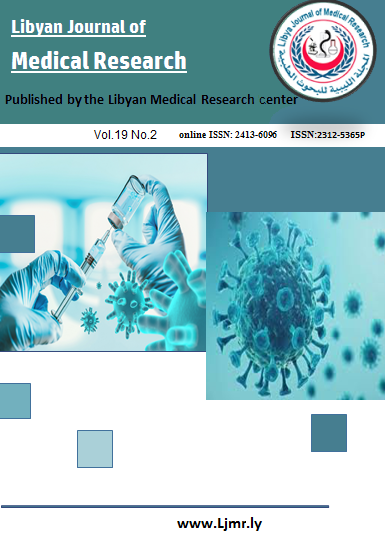Histopathological Grades of Colorectal Cancer: A One-Year Single-Center Study
DOI:
https://doi.org/10.54361/LJMR.19.2.08Keywords:
histopathology grade, age, colorectal cancer, LibyaAbstract
Background: Colorectal cancer (CRC) poses a major global health burden. It necessitates careful assessment for prognosis and treatment planning. Histopathological grading plays a key role in prognosis and treatment planning. Local studies are essential to understand CRC characteristics in specific populations and guide national health strategies. This study aimed to assess the histopathological grading patterns among individuals diagnosed with CRC during a one-year interval at the National Cancer Institute in Subrata, Libya, in 2024. Material and Methods: A cross-sectional retrospective analytic study was conducted involving 202 patients consecutively selected from the medical records of Subrata National Cancer Institute in 2024 using descriptive statistics and the chi-square test for association through SPSS software. Results: This study reveals that the majority of patients (78.7%) had Grade II tumors, with the highest frequency (35.1%) in patients over 60 years of age. Grade I and Grade III accounted for 17.8% and 3.5% of cases, respectively. A statistically significant association was found between histopathological grade and age (χ² = 14.9, p = 0.021) Conclusion: These findings underscore the urgent need for implementing targeted regional strategies, including enhanced public awareness campaigns, robust screening programs for early detection, and strengthening of the diagnostic infrastructure to improve CRC outcomes in Libya.
Downloads
References
1- Sung H, Ferlay J, Siegel RL, Laversanne M, Soerjomataram I, Jemal A, Bray F. Global Cancer Statistics 2020: GLOBOCAN Estimates of Incidence and Mortality Worldwide for 36 Cancers in 185 Countries. CA Cancer J Clin. 2021 May;71(3):209-249. doi: 10.3322/caac.21660. Epub 2021 Feb 4. PMID: 33538338.
2- Mattiuzzi C, Sanchis-Gomar F, Lippi G. Concise update on colorectal cancer epidemiology. Ann Transl Med. 2019 Nov;7(21):609. doi: 10.21037/atm.2019.07.91. PMID: 32047770; PMCID: PMC7011596.
3- Xi Y, Xu P. Global colorectal cancer burden in 2020 and projections to 2040. Transl Oncol. 2021 Oct;14(10):101174. doi: 10.1016/j.tranon.2021.101174. Epub 2021 Jul 6. PMID: 34243011; PMCID: PMC8273208.
4- Chen S, Zhang M, Wang J, Xu M, Hu W, Wee L, Dekker A, Sheng W, Zhang Z. Automatic Tumor Grading on Colorectal Cancer Whole-Slide Images: Semi-Quantitative Gland Formation Percentage and New Indicator Exploration. Front Oncol. 2022 May 11;12:833978. doi: 10.3389/fonc.2022.833978. PMID: 35646672; PMCID: PMC9130480.
5- Dubansky B, Lewis S, Telgenhoff D. Classification and Histological Characteristics of Colorectal Cancer. Am Soc Clin Lab Sci. 2024 Sep 18. doi:10.29074/ascls.2022003206. Epub ahead of print.
6- Miyakawa T, Kawamura H, Honda M, Takano Y, Kinuta S, Kamiga T, Yamazaki S, Muto A, Shiraso S, Yamashita N, Iwao T, Kono K, Konno S. Impact of histological subtype on prognosis in stage IV colorectal cancer: A population-based cohort study. PLoS One. 2022 Mar 3;17(3):e0264652. doi: 10.1371/journal.pone.0264652. PMID: 35239725; PMCID: PMC8893698.
7- Xiao H, Yoon YS, Hong SM, Roh SA, Cho DH, Yu CS, Kim JC. Poorly differentiated colorectal cancers: correlation of microsatellite instability with clinicopathologic features and survival. Am J Clin Pathol. 2013 Sep;140(3):341-7. doi: 10.1309/AJCP8P2DYNKGRBVI. PMID: 23955452.
8- Verhulst J, Ferdinande L, Demetter P, Ceelen W. Mucinous subtype as prognostic factor in colorectal cancer: a systematic review and meta-analysis. J Clin Pathol. 2012 May;65(5):381-8. doi: 10.1136/jclinpath-2011-200340. Epub 2012 Jan 18. PMID: 22259177.
9- Kazama Y, Watanabe T, Kanazawa T, Tanaka J, Tanaka T, Nagawa H. Microsatellite instability in poorly differentiated adenocarcinomas of the colon and rectum: relationship to clinicopathological features. J Clin Pathol. 2007 Jun;60(6):701-4. doi: 10.1136/jcp.2006.039081. PMID: 17557871; PMCID: PMC1955052.
10- Venderbosch S, Nagtegaal ID, Maughan TS, Smith CG, Cheadle JP, Fisher D, Kaplan R, Quirke P, Seymour MT, Richman SD, Meijer GA, Ylstra B, Heideman DA, de Haan AF, Punt CJ, Koopman M. Mismatch repair status and BRAF mutation status in metastatic colorectal cancer patients: a pooled analysis of the CAIRO, CAIRO2, COIN, and FOCUS studies. Clin Cancer Res. 2014 Oct 15;20(20):5322-30. doi: 10.1158/1078-0432.CCR-14-0332. Epub 2014 Aug 19. PMID: 25139339; PMCID: PMC4201568.
11- Alzahrani SM, Al Doghaither HA, Al-Ghafari AB. General insight into cancer: An overview of colorectal cancer (Review). Mol Clin Oncol. 2021 Dec;15(6):271. doi: 10.3892/mco.2021.2433. Epub 2021 Nov 1. PMID: 34790355; PMCID: PMC8591689.
12- Siegel RL, Miller KD, Wagle NS, Jemal A. Cancer statistics, 2023. CA Cancer J Clin. 2023 Jan;73(1):17-48. doi: 10.3322/caac.21763. PMID: 36633525.
13- Duan B, Zhao Y, Bai J, Wang J, Duan X, Luo X, Zhang R, Pu Y, Kou M, Lei J, Yang S. Colorectal Cancer: An Overview. In: Morgado-Diaz JA, editor. Gastrointestinal Cancers [Internet]. Brisbane (AU): Exon Publications; 2022 Sep 30. Chapter 1. PMID: 36343150.
14- Page AJ, Cosgrove DC, Herman JM, Pawlik TM. Advances in understanding of colorectal liver metastasis and implications for the clinic. Expert Rev Gastroenterol Hepatol. 2015 Feb;9(2):245-59. doi: 10.1586/17474124.2014.940897. Epub 2014 Jul 18. PMID: 25033964.
15- Jin LJ, Chen WB, Zhang XY, Bai J, Zhao HC, Wang ZY. Analysis of factors potentially predicting prognosis of colorectal cancer. World J Gastrointest Oncol. 2019 Dec 15;11(12):1206-1217. doi: 10.4251/wjgo.v11.i12.1206. PMID: 31908725; PMCID: PMC6937433.
16- Pilleron S, Sarfati D, Janssen-Heijnen M, Vignat J, Ferlay J, Bray F, Soerjomataram I. Global cancer incidence in older adults, 2012 and 2035: A population-based study. Int J Cancer. 2019 Jan 1;144(1):49-58. doi: 10.1002/ijc.31664. Epub 2018 Oct 30. PMID: 29978474.
17- Jiang Y, Yuan H, Li Z, Ji X, Shen Q, Tuo J, Bi J, Li H, Xiang Y. Global pattern and trends of colorectal cancer survival: a systematic review of population-based registration data. Cancer Biol Med. 2021 Sep 6;19(2):175–86. doi: 10.20892/j.issn.2095-3941.2020.0634. Epub ahead of print. PMID: 34486877; PMCID: PMC8832952.
18- Shiraj-Um-Mahmuda S, Begum F, Rahman MM, Rahman P, Islam T, Shabnam US, et al. Demographic and clinicopathological evaluation of colorectal adenocarcinoma in Bangladesh at a tertiary level hospital. Cancer Stud Ther J. 2023;8:1-8. DOI: 10.31038/CST.2023811.
19- Barresi V, Reggiani Bonetti L, Ieni A, Caruso RA, Tuccari G. Histological grading in colorectal cancer: new insights and perspectives. Histol Histopathol. 2015 Sep;30(9):1059-67. doi: 10.14670/HH-11-633. Epub 2015 May 25. PMID: 26004398.
20- Kobayashi T, Ishida M, Miki H, Yamamoto N, Harino T, Yagyu T, Hori S, Hatta M, Hashimoto Y, Kotsuka M, Yamasaki M, Inoue K, Hirose Y, Sekimoto M. Prognostic scoring system based on indicators reflecting the tumor glandular differentiation and microenvironment for patients with colorectal cancer. Sci Rep. 2024 Jun 20;14(1):14188. doi: 10.1038/s41598-024-65015-2. PMID: 38902294; PMCID: PMC11189912.
21- Ji X, Kang M, Zhao X, Li X, Guo Y, Xie P, Yu Y, Tian Z. Poorly differentiated cluster grade-a vital predictor for lymph node metastasis and oncological outcomes in patients with T1 colorectal cancer: a retrospective study. BMC Gastroenterol. 2022 Sep 5;22(1):409. doi: 10.1186/s12876-022-02492-7. PMID: 36064316; PMCID: PMC9442993.
22- Lukman K, Gunawan GG, Rudiman R, Sribudiani Y, Hasibuan LY, Dewayani BM, Nugraha P, Primastari E. Relationship between age and the histopathological features to chemotherapy response in colorectal cancer patients: a prospective observational study. J Coloproctol (Rio J). 2023;43(4):e300-e309. doi:10.1055/s-0043-1776890.
23- Yao H, Li C, Tan X. An age stratified analysis of the biomarkers in patients with colorectal cancer. Sci Rep. 2021 Nov 17;11(1):22464. doi: 10.1038/s41598-021-01850-x. PMID: 34789836; PMCID: PMC8599678.
24- Carbajal-López B, Coronel-Hernández J, Herrera M, Ruiz-Garcia E, Miyagui-Adame SM, Diaz-Romero C, et al. Age as a predictor of overall survival in colorectal cancer. Diagnostics (Basel) [Internet]. 2024 Nov 14 [cited 2025 Jul 2];14(22):2550. Doi: 10.3390/diagnostics14222550
25- Sugiarto S, Nurfitriana A, Marindawati M. Relationship between age and sex with histopathological differentiation of colorectal adenocarcinoma. Muhammadiyah Med J. 2022;3(2):67-73. doi:10.24853/mmj.3.2.67-73
Downloads
Published
Issue
Section
License
Copyright (c) 2025 Sumaya Taher Draa , Fadia T.M Oshkondale, Adel M Abdallaa, Mohamed Khalifa Al-Kawash4, Mohamed Mohamed Altoumi, Kholoud Abd Al-Razzaq Kardmain, Khitam Mohamed Al-Shein (Author)

This work is licensed under a Creative Commons Attribution-NonCommercial-NoDerivatives 4.0 International License.
Open Access Policy
Libyan journal of medical Research (LJMR).is an open journal, therefore there are no fees required for downloading any publication from the journal website by authors, readers, and institution.
The journal applies the license of CC BY (a Creative Commons Attribution 4.0 International license). This license allows authors to keep ownership f the copyright of their papers. But this license permits any user to download , print out, extract, reuse, archive, and distribute the article, so long as appropriate credit is given to the authors and the source of the work.
The license ensures that the article will be available as widely as possible and that the article can be included in any scientific archive.
Editorial Policy
The publication of an article in a peer reviewed journal is an essential model for Libyan journal of medical Research (LJMR). It is necessary to agree upon standards of expected ethical behavior for all parties involved in the act of publishing: the author, the journal editorial, the peer reviewer and the publisher.
Any manuscript or substantial parts of it, submitted to the journal must not be under consideration by any other journal. In general, the manuscript should not have already been published in any journal or other citable form, although it may have been deposited on a preprint server. Authors are required to ensure that no material submitted as part of a manuscript infringes existing copyrights, or the rights of a third party.
Authorship Policy
The manuscript authorship should be limited to those who have made a significant contribution and intellectual input to the research submitted to the journal, including design, performance, interpretation of the reported study, and writing the manuscript. All those who have made significant contributions should be listed as co-authors.
Others who have participated in certain substantive aspects of the manuscript but without intellectual input should only be recognized in the acknowledgements section of the manuscript. Also, one of the authors should be selected as the corresponding author to communicate with the journal and approve the final version of the manuscript for publication in the LJMR.
Peer-review Policy
- All the manuscripts submitted to LJMR will be subjected to the double-blinded peer-review process;
- The manuscript will be reviewed by two suitable experts in the respective subject area.
- Reports of all the reviewers will be considered while deciding on acceptance/revision or rejection of a manuscript.
- Editor-In-Chief will make the final decision, based on the reviewer’s comments.
- Editor-In-Chief can ask one or more advisory board members for their suggestions upon a manuscript, before making the final decision.
- Associate editor and review editors provide administrative support to maintain the integrity of the peer-review process.
- In case, authors challenge the editor’s negative decision with suitable arguments, the manuscript can be sent to one more reviewer and the final decision will be made based upon his recommendations.















